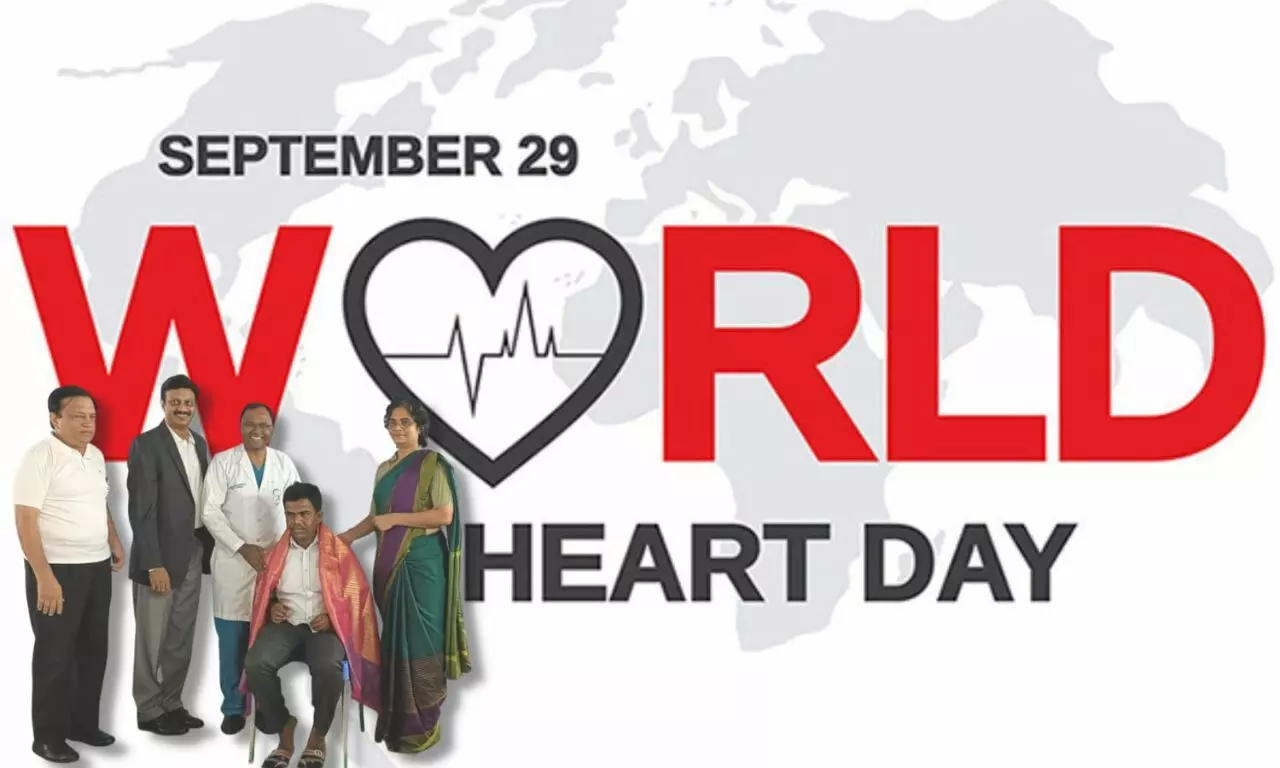On World Heart Day, Nalgonda man's transplant story, exemplary recovery celebrated
In 2018, Lingaswamy developed health complications, which in medical parlance is called 'Idiopathic Dilated Cardiomyopathy' (DCMP).
By Kaniza Garari
Hyderabad: In 2018, Lingaswamy, a young driver from Gundrampally in Nalgonda district, underwent heart transplant surgery. He received the heart of a brain-dead patient, and it saved his life. Since then, he has led a healthy life. This is a rare survival story for the rate of heart transplant success is not very promising—only 1 in 1,000 patients survive.
On World Heart Day, the heart transplant survivor and his achievement in taking care of his health post-transplantation was recognised by the Telangana government's Jeevandan scheme. Lingaswamy was felicitated for leading a healthy life after transplantation in a function organised on Thursday.
Telangana Jeevandan in-charge, Dr. Swarnalatha, said Lingaswamy's life and the manner he bounced back to active life is an exemplary example of the life-saving initiative in the state. "The organ donation initiative via Jeevandan and Arogyasri has helped those who are unable to undergo these highly complex surgeries. The care and follow-up by Lingaswamy show his dedication towards leading a healthy life," Dr. Swarnalatha said.
A damaged heart replaced
In 2018, Lingaswamy developed health complications, which in medical parlance is called 'Idiopathic Dilated Cardiomyopathy' (DCMP). His heart became very weak, and he did not know the reasons for the sudden setback to his health. Against the normal pumping capacity of 65-70%, his count dropped to 25% because of DCMP. This had a direct bearing on his other organs, whose functioning were also adversely affected.
Medical experts say that a heart transplant surgery is the only way to save a person in such a critical stage. Once it was decided that a heart transplant surgery was the best option for Lingaswamy, efforts were intensified through the Jeevandan network. Within a short period, a heart was collected from a brain-dead patient and transplanted. The surgery was done free of cost under the government's Arogyasri scheme at Century Hospital by Dr. Praveen Nandagiri, heart transplant surgeon, and Dr. Hemant Kumar Kaukuntla, chief cardiothoracic surgeon and vice-chairman of Century Hospital. Four years down the line, Lingaswamy is healthy and leading a normal life.
Sudden deterioration of the heart
The sudden deterioration of the heart in young patients is a major challenge in the present times. Heart diseases in the productive age group due to lifestyle changes leading to obesity, diabetes, hypertension, and undiagnosed underlying diseases is a major challenge.
Dr. Ravi Sankar Erukulapati, a senior endocrinologist at Apollo Hospitals, explained, "Food, from a basic means of survival, has become a comfort provider for the palate and the brain. Junk and processed food, unhealthy eating patterns, and excessive consumption of salts and fat, are increasing the risk of heart diseases and causing heart failures." Modern lifestyle risk factors like smoking, alcohol, poor physical activity, stress, and anxiety are other risk factors for heart diseases, explained consultant cardiologist Dr. N. Dhananjaneya Reddy of Care Hospitals.
Dr. Reddy said 70 to 80% of heart diseases are preventable with regular heart check-ups and early identification of risk factors accompanied with modification in lifestyle.
A challenge in present times
Heart diseases among the young are a challenge and only a few can opt for heart transplantation. The paucity of organs and survival after transplant continue to be a major challenge. There are only a few successful examples, like Lingaswamy's, due to the care taken after the transplantation.
Dr. Rajiv Garg, a senior interventional cardiologist at Aware Gleneagles Global Hospital, said those in the productive age group developing heart diseases is a concern. "With the rising incidence of obesity in the country, it is estimated that it will create a burden of approximately Rs. 1.9 lakh crores, that is 1% of the country's GDP. On World Heart Day, youngsters in India must be made aware of this growing problem and at a very early age they must make the right choices for healthy living."